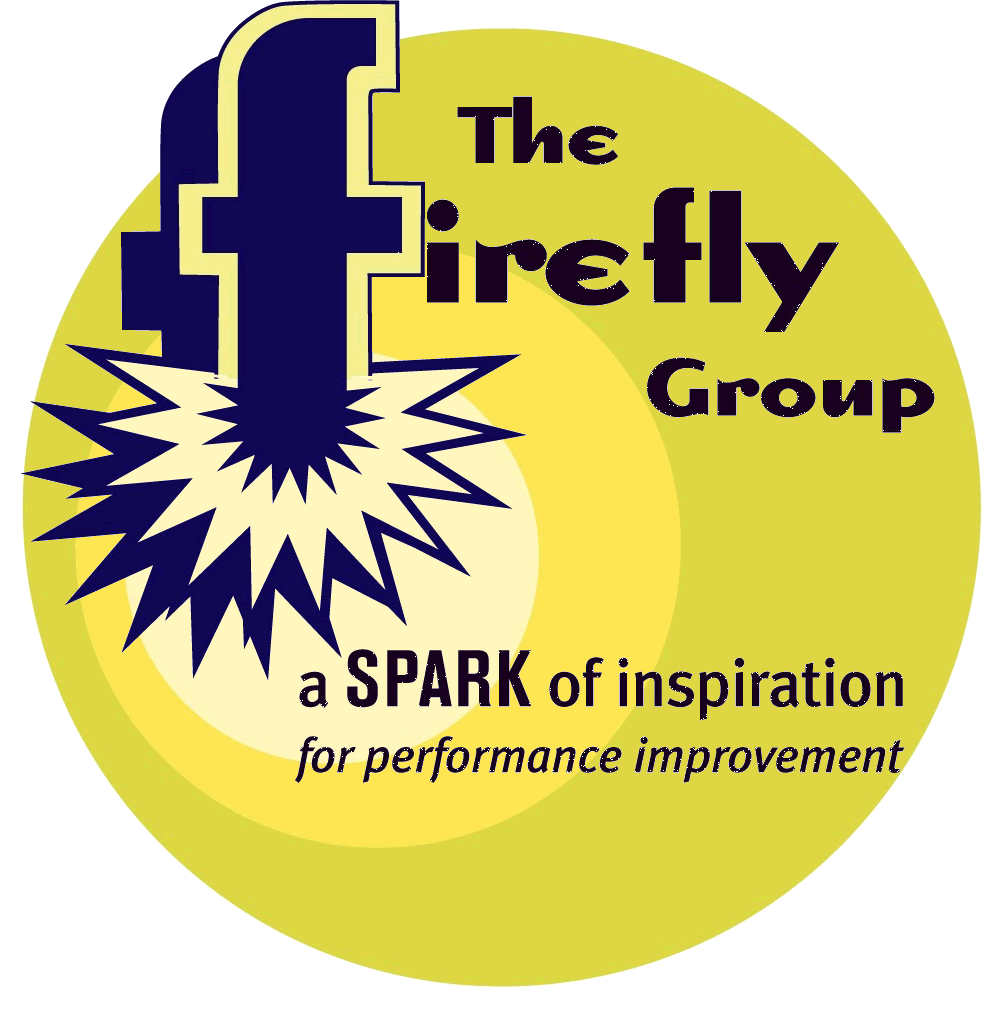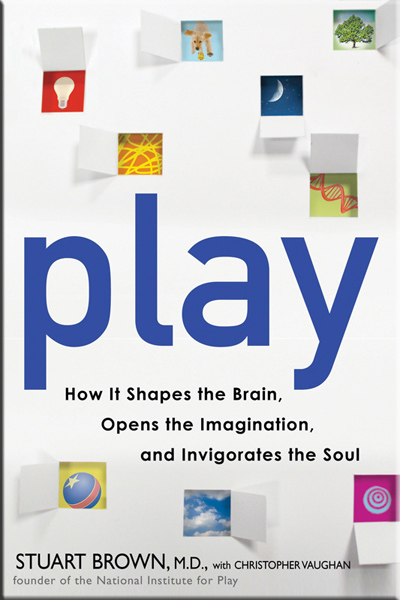


JUNE 2009
In this Issue: Reader Feedback: An Innovation Experiment
|
Say
It Quick |
Discoveries bits of serendipity to inspire and motivate |
Ideas fuel for your own continuous learning |
Activities tips and tricks you can try today |
| The Best Holiday | Start Goofing Around | Mind Games | Go Play |
Read this story for a 99-word example of the transformational power of play. Then click to Discoveries and see how many characteristics of play I experienced in this incident.
The Best Holiday
‘Twas, the day after Christmas. A vacation for me but not, unfortunately,
for the rest of my family so I’m left to my own devices. What to do? Let’s
see, there’s that picture that needs to be hung but I’ll have to paint over
the black marks left by the photo of Aunt Maybelle.
Wow, there are black marks in every room. Two hours later I’m still spot painting the house. Stranger still, I’m enjoying it. What’s going on? Oh, yes, painting was my choice.
When we follow our own decisions, we are motivated and satisfied.
 Start
Goofing Around
Start
Goofing Around
Play by Stuart Brown
When I saw the one-word title of Stuart Brown's book, Play, at the book store, I had to pick it up. And when I read the subtitle, “How It Shapes the Brain, Opens the Imagination, and Invigorates the Soul,” I simply had to buy it. With stories and research from biology, psychology, and zoology, Brown's book explains why we played so much as kids – and why we need to play just as much as adults.
Sure, you've probably heard that, through play, children rehearse adult roles. But did you know that both play and sleep perform the same role in enabling our brains to organize thoughts and memories? That play is the best way to sustain a long-term romantic relationship? Or that the majority of people convicted of murder grew up with a play deficit? The author uses facts like these to effectively argue the importance of play in human development and every day life.
Brown avoids an absolute definition of play, preferring, instead, a set of broader characteristics. For him, play is an activity that is . . .
With this framework, Brown discusses the merits of organized and unorganized play, sports, and video-based games. He also talks about whether there's ever a downside to play. Through his explanations, Brown reveals the promise of play for fostering creativity, solving problems, reforming education, healing relationships, and helping us lead more fulfilling lives.
Quite a lot of value for what we've been taught is “just goofing around!”
(Stewart Brown is founder of The National Institute for Play. Learn more HERE.)
Mind Games
“Are we having fun yet?”
That's a question we've all heard – or offered – as droll humor in a dull moment. But after reading Stuart Brown's book Play, I'm now likely to answer, “Yes, we're having fun – if you choose to!”
One key concept Brown clarifies is that play is less an activity and more a state of mind. Any game that turns mean-spirited, or overly aggressive is no longer play. Instead, it has turned into violence of one form or another. With a negative intent, play can be corrupted.
But turnabout is fair play, as they say. So any activity, no matter how serious or inane, can become play with a positive intent. Inject drudge work with humor, spontaneity, and imagination, and a sense of play is born. What was once lethal is now lively.
A big part of play is also imaginary. We slip into a role when we are “it” or when we “go directly to jail without passing GO!” We suspend beliefs and assumptions to create an environment where we can play, practice, and try on a new persona. We can be silly and outrageous if we wish or we can imagine ourselves as a professional. If we aren't “having fun yet,” perhaps we can pretend to be having fun – at least until fun becomes a reality!
One of my friends who grew up with alcoholic parents said she learned early that the one thing she could control during her chaotic childhood was her own attitude. If that's true, why not choose a playful attitude and turn any moment into “having fun now” instead of waiting for “having fun yet?”
For another example of choosing a playful attitude, click to Say it Quick. Then, if you are able to convince yourself that today's work is actually something fun, your play idea with us. It may just be what we need too!
Go Play –
Right Now!
Given this month's Discovery, my suggested activity is hardly a surprise.
Stuart Brown is up front in saying that what different people call play is highly individualized. Each of us finds different activities that are fun or intrinsically rewarding. So I won't tell you what to do when you go play. There are just too many possibilities.
Instead, I'd like to challenge you to experiment with Brown's concept of play. Look again at his seven play characteristics. Choose three of them then go do something that will give you a sense of those play elements.
What would it be like to make a conscious decision (voluntary) to use your valuable time (freedom from time) doing something that you know is (apparently) purposeless? What will you choose to do that's fun, opens you to surprises, and that you'll want to do again and again?
Will you choose something tried and true or totally novel? Will you set up a break in your busy schedule or will you jump up from your computer right now? Will your activity be physical or cerebral; indoor or fresh air; with others or solitary?
Whatever your choice, be intentional and be observant. How does what you chose fit with who you are and how you want to be? What makes something fun for you and how can you incorporate that essence into more of your work, relationships, and everyday living?
After your play experiment, what you learned! Have fun!
An Innovation
Experiment
In our May News Flash, we highlighted the book CATS by Stephen Lundin
with a challenge to break up your routine in order to get the creativity flowing.
Here's the response of one reader who did just that and made both a discovery
and a commitment in the process.
"I was forced to break a morning routine last week when I had a deadline and work that had to be done. Instead of getting up at 6, I got up at 5. I was amazed at how quiet it was and how much I got done because I was so focused. I actually found myself with about 10 minutes (the 2 mornings I did this) to just sit, look out my kitchen window and ENJOY my morning coffee instead of GULPING it down.
"This time gave me pause before starting my day to take a breath and notice how my trees were budding and other small details I miss in the rush of life.
"I know it's the old adage to 'take time to smell the flowers', but it really worked. I'm not saying I'm going to be getting up everyday at 5:00, but I have planned for at least one day a week to get up earlier and enjoy whatever comes with that.
"I want to be able to keep that commitment to myself of one day a week. I know every day is unrealistic (married with 3 children!). Too much "life" happens with that many people in the mix and one day is something I can be excited about. It may eventually make its way to 2-3 days, but for now, I am quite pleased with one day."
Jason Barnaby
Indianapolis
Thank you Jason! --Brian
Read previous
issues. Click Archives!
To add or delete your name to our mailing list, email
with a short note in the subject line.
We want this newsletter to be practical, succinct, and thoughtful. If you have suggestions about how we can meet these criteria, please let us know! Send us an with your thoughts and ideas.
Home
| Services
| Products
| Mission
| Ideas |
The Group
| The Buzz
(c)
2005 The Firefly Group